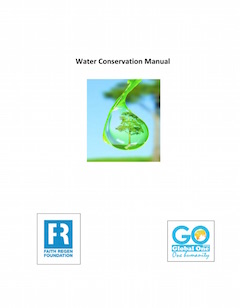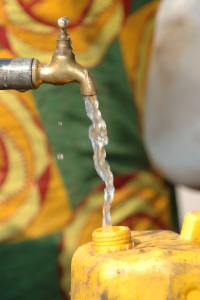Islamic Water Conservation Manual aims to save lives in Bangladesh
July 17, 2012:
 |
 |
 |
The cover of the English edition of the manual |
A new handbook, published in English and Bengali, aims to help the people of Bangladesh make better use of clean water and prevent unnecessary il-health and even death from waterborne diseases.
It is a shocking fact that, according to the World Health Organisation, diarrhoea kills more children globally every year than AIDS, malaria and measles combined. Much of this problem can be traced to polluted and infected water and, indeed, the WHO estimates that around 1.8 million deaths a year can be attributed to waterborne diseases - 24% of all deaths in Bangladesh are related to dirty water.
We know that clean water is essential for health yet it is a scarce commodity in much of the world. In Bangladesh alone 32 million people lack safe drinking water, a problem that is escalating as the rising global sea level - caused by climate change - forces salt water further and further inland. Village wells and ponds are becoming salty and unfit for drinking, forcing people to walk many miles to fetch clean, salt-free water, an exhausting and endless task that is usually allotted to women.
 |
| “And have you seen the water that you drink?
Is it you who brought it down from the clouds, or is it We who bring it down?
If We willed, We could make it bitter, so why are you not grateful?” (Qur’an 56: 58-70) |
|
 |
 |
An Islamic understanding of the issuesIn this context the UK-based Islamic NGO Faith Regen, in partnership with ARC and the Global One 2015 organisation, has produced a Water Conservation Manual for distribution around schools and medical clinics in Bangladesh during special water awareness events. What makes this manual stand out is that it is based on Islamic traditions and texts that teach of the spiritual significance of clean water as a God-given blessing to be used with respect and care.
Muslims, like everyone else, rely on water for sustenance but pure water is also of particular importance for Islamic rituals like wudu, the purification washing required before each session of daily prayers, and ghusi, the ritual bathing applied after death (among other circumstances). As the authors point out: “With this in mind, the believers are also frequently reminded that it is God
who provides clean, ‘sweet’ water for the people to use and it is a blessing and mercy from Him that He can just as easily withhold.”
 |
 |
 |
PHOTO: Julian Harneis (Creative Commons) |
Practical tips and guidelinesAs well as explaining the Islamic significance of the issues, the Water Conservation Manual offers a collection of straightforward tips to raise awareness of the many ways clean water can be conserved and protected from pollution as well as important sanitation guidelines to help prevent waterborne infections. As the manual puts it: “Water conservation is the responsibility of everyone. Not just the government or the NGOs or big businesses. Everyone needs to manage their water use.”
Useful LinksDownloadable copy of the Water Conservation Manual (English edition)
Faith Regen website
Global One 2015 website
Information about ARC's international Education and Water project
|

